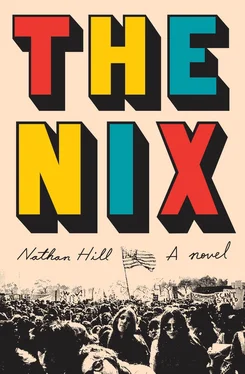It is April, four months before her first college classes begin, and she sits in her backyard, and inside the house the television howls its news: Martin Luther King has been killed in Memphis. Chicago is a rage tonight — of rioters, looters, arsonists. Pittsburgh, too. And Detroit, Newark. Mayhem in San Francisco. Fires three blocks from the White House.
Faye had watched until she could no longer bear it, then came out here, into the backyard and the wide-open night and the sounds of ChemStar rumbling somewhere distant and loud, the whistles and cranes and crankshafts, the cascade of metal as a train abruptly lurches forward, how commerce keeps buzzing, even tonight. All these men who won’t know a thing about the riots, she wonders why they’re still working. Who needs chemicals this much? A factory is a terrifying, relentless thing.
She hears the patio door open, and footsteps — Faye’s mother, coming with another update.
“It’s anarchy,” she says, exasperated. She’s been glued to Cronkite all night long. “They’re tearing up their own neighborhood. ”
The Chicago police have, apparently, sealed off the ghetto. Molotov cocktails are hurled into liquor stores. Snipers on the tops of buildings. Cars smashed on the street. Traffic lights wrenched down and twisted like tree branches. Bricks thrown through windows.
“What good will it do?” her mom says. “All this destruction? With everybody seeing on TV? Do these rioters really think this is going to make anyone sympathetic to their cause?”
Martin Luther King was shot in the neck while standing on his hotel balcony — every reporter and anchor on TV describes this exactly the same way, using the same words. Words that nobody’s ever thought about have popped out of ordinary language and become incantations. Lorraine Motel. Remington rifle. Mulberry Street. (And how could the shot have been fired across something as wonderful-sounding as Mulberry Street?) Police are on the lookout. Massive manhunt. Early thirties, slender build. White male. The man in room five.
“Probably just an excuse for these people to do whatever they want,” her mom says. “Running around with their shirts off looting stores like: Hey, let’s get a new stereo without having to pay for it.”
Faye knows her mom’s interest in the rioters is an incidental thing. Mostly what she’s out here to do is convince Faye not to go to college in Chicago. The riot has simply given her a delicious new angle. She wants Faye to stay home and go to the nice little two-year school the next town over, and she reminds Faye of this every chance she gets, a more or less constant needling attack that began when Faye was accepted, a few months ago, to Chicago Circle.
“Listen,” her mom says, “I’m all for civil rights, but you can’t be some kind of animal destroying innocent people’s private property.”
Chicago Circle is the catchy name for the brand-new university in downtown Chicago: the University of Illinois at Chicago Circle. The promotional brochures that came with Faye’s acceptance letter spoke of Circle as the UCLA of the Midwest. It was the world’s first thoroughly modern campus, the brochures said, built in just the last few years, conceptually groundbreaking, a campus unlike any other: created as a single vast system using the most fashionable principles of social design and engineering; buildings constructed from the most indestructible materials; a raised walkway, one story up, to get you from building to building with a bird’s-eye view, a kind of pedestrian expressway in the sky; innovative architecture that included field theory mathematics, which as far as Faye could tell involved overlaying squares on top of each other and rotating each square slightly to achieve a many-angled, multifaceted design that looked, from above, like a honeycomb. This was an advance at least as important as the flying buttress or the geodesic dome, the brochure said, and it was all part of the school’s overriding mission: to build the Campus of the Future.
Faye had applied to the school in secret.
“If these people weren’t so destructive and angry,” her mom says, “I think regular people would be more likely to support them. Why don’t they go out and organize voters? Propose some solutions instead of just smashing everything?”
Faye looks out across the backyard to ChemStar’s distant glow. Her father would be working now, probably ignoring the news of the world. The one time he spoke on the matter of college was when Faye showed him Circle’s acceptance letter and brochure. He was the first person she told. After a brief private celebration in her bedroom, she came to him in the living room, where he was reading the newspaper in his easy chair. She handed him the documents. He looked at her and then at the papers. Read through them silently, slowly accommodating this new information. Faye was ready to burst. She waited for him to praise this extraordinary thing she’d done. But when he finished reading, he simply handed back the papers and said, “Don’t be ridiculous, Faye.” Then he opened the newspaper and gave it a shake to snap out the wrinkles. “And don’t tell anyone,” he said. “They’ll think you’re bragging.”
“It’s chaos in the streets!” her mom says. She’s getting really roiled now. Sometimes lately it’s like she’s a top capable of spinning herself. “I don’t even know what they’re fighting for! These people. What do they want?”
“Probably, for starters, less murder,” Faye says. “That’s just a guess.”
Her mom gives her a long, measured look. “When John Kennedy was shot we didn’t riot.”
Faye laughs. “Yeah, because those things are exactly equivalent.”
“What’s gotten into you tonight?”
“Nothing, Mom. Sorry.”
“I’m worried about you.”
“Don’t be.”
“I’m worried about you going to Chicago,” she says, finally coming around to her point. “It’s just — it’s so far away. And so big. And so full of, you know, this urban element. ”
By which she means Negroes.
“I don’t want to scare you,” she says, “but think about it. One night you’re coming home from class and they snatch you and take you into a dark alley and rape you and shove a gun in your mouth so hard you can’t even pray to God.”
“Okay!” Faye says, and she stands up. “Thanks, Mom. Great talking to you.”
“Plus, what if you have an episode while you’re away? What are you going to do if I’m not around?”
“I’m leaving now.”
“Where are you going?”
“Out.”
“Faye.”
“Nowhere, Mom. I just need to take a drive. Clear my head.”
Which is a lie. She’s going to Henry’s, of course. Good, gentle Henry. She will go to him tonight, before her mom can scare her even more with tales of violence and rape. She takes the car and drives out of her little neighborhood, a parcel of small bungalows called Vista Hills (but this is Iowa, and that name has always confused her, the Vista Hills sign showing a wide panorama atop mountains that nowhere in this state actually exist). Then out onto the main boulevard, past the Dairy-Sweet Good-Food, the Dollar General, Schwingle’s Pharmacy. She drives past the Quik Mart station, across the street from the Spotless Touchless, past the gray water tower that some of the old folks call the green tower because it was green many years ago, before the sun bleached it, and Faye wonders if she should pity those who live so narrowly inside their memories. Then past the VFW and the restaurant named Restaurant with its sign that never changes: ALL YOU CAN EAT WALLEYE. FRIDAY, SATURDAY, AND WEDNESDAY.
She turns onto the highway and sees in the distance, through a clearing in the trees, what she playfully calls the lighthouse: It’s really a tower at the nitrogen plant where gas is vented and burned, where one can see, at night, a blue flame. So it looks like a lighthouse, sure, but it’s also a joke about geography: Iowa, after all, is landlocked for a billion miles. This is the way to Henry’s. She drives the empty streets, the night like any other night except for what’s on TV. The catastrophe on the news means people won’t notice her — they won’t be on their porches, in open garages, won’t say: There goes Faye. I wonder where she’s heading. Faye is aware of the attention, the neighborly curiosity, the unyielding abstract gaze of the town, the way everything sort of shifted when word got out about Circle. People at church who previously had no outward opinion of Faye whatsoever suddenly began saying things that felt hostile and passive-aggressive: “I suppose you’ll forget about us when you’re off in the big city,” or “I guess you won’t be coming back to our boring little town,” or “I imagine when you’re a big shot you won’t have time for little old me,” and so on. Things that seemed to have an ugly edge to them, like: You think you’re better than us?
Читать дальше












